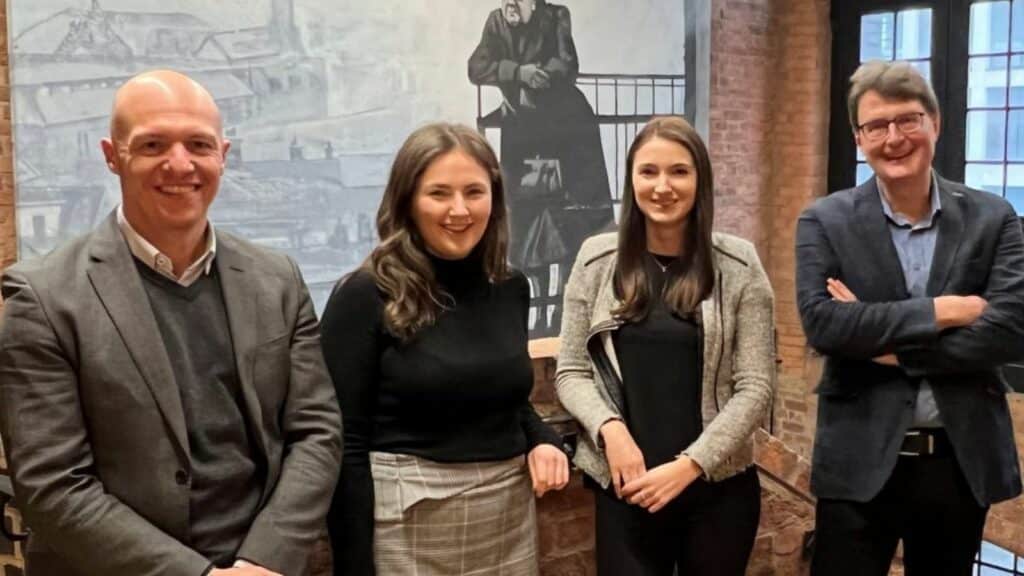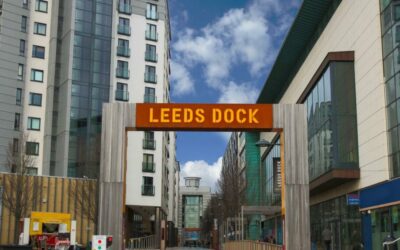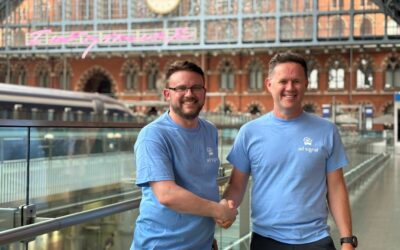The North is brimming with potential to build world-class tech businesses. But is that potential really being fulfilled or is the region still being held back by old challenges in new clothes?
That’s the question at the heart of GRAFT – Prolific North’s newly launched deep dive tech series – which puts the spotlight on the people, places and power structures shaping the future of Northern tech.
In our latest feature, we turn to the investors backing the region’s brightest start-ups and scale-ups to find out what’s working, what’s holding us back – and what needs to change to take Northern tech to the next level.
READ MORE: ‘Why I’m moving to Manchester to scale my AI business’
“We believe you can build a world-class business from any location in the North right now, thanks to a number of organisations working tirelessly to better connect us,” Ben Davies, marketing director at Praetura Ventures, tells Prolific North.
Since 2019, Manchester-based venture capital firm Praetura Ventures has backed dozens of Northern companies including Peak which was recently snapped up by Nasdaq-listed UiPath to “supercharge” its AI-powered automation.
Praetura also runs the Northern Powerhouse Investment Fund II mandate for the £100m fund, dedicated to equity in the North West of England.
GET INVOLVED: Everything you need to know about our GRAFT event in May
Beyond Praetura, Davies has been “blown away by the work” being done in areas outside the major city centre start-up hubs from Fhunded’s work in Lancashire, Barclays Eagle Labs work in Cumbria, Bruntwood SciTech’s work at Alderley Park, and ClimbUK’s work across the North.

While no tech landscape “stays the same”, the North “paints an interesting picture,” says David Hall, executive chairman at YFM Equity Partners (YFM).
YFM is an independently owned, private equity investor that invests £2m to £15m into businesses with ‘strong growth potential’ through a regional network of offices in London, Leeds, Manchester, Reading and Birmingham.
“There’s huge dynamism, with life sciences and cybersecurity emerging recently as superclusters, adding to existing strengths in enterprise software, media, and digital technology,” he explains.
With the relocation of GCHQ to the North set to “attract and develop talent” in the region, he says this is translating into an “even stronger start-up community”.
READ MORE: How Northern tech is ‘grafting’ its way to the top with global ambitions
Over at DSW Ventures, an early-stage investor and partner in British Business Investments’ £150m Regional Angels Programme, investment manager Emma Cassidy has also observed “rapid” growth across the North’s tech landscape.
“In places like Manchester, Leeds, Liverpool, Sheffield and Newcastle, we’ve seen a lot more investment in these regions over the last few years as they are emerging as strong hubs for innovation across healthtech, life sciences, AI, cyber but also advanced manufacturing.”
Early-stage enthusiasm, scale-up struggles?
There is a “growing” number of accelerators, workspaces, and investment activity across the North, leading to “a lot more support for early-stage companies” explains Cassidy from DSW Ventures.
“It means founders can build communities, friends and their own cohorts, where they’re each able to offer advice based on their previous experiences. I think that’s really helpful.”
For Jess Jackson, PraeSeed Lead at Praetura Ventures, the health of a start-up ecosystem is linked to an “upsurge in accelerators and incubators”.
“If these are popping up at an increased frequency, within or alongside co-working spaces in a city or town, then it’s probably because there’s a healthy startup scene, significant public funding, decent investment activity, or a combination of all these.”
The Turing Innovation Catalyst (TIC), launched by Capital Enterprise, is just one of the many examples of accelerator programmes based across the North.
“Capital Enterprise is trying to produce founders that have realistic ideas about building a venture sale company. We do this by creating programmes that focus on helping founders to understand term sheets – what they’re being offered by investors and what is involved; creating good unit economics; helping them understand their customers and successfully commercialising their ideas,” says Jonny Clarke, CEO of Capital Enterprise.

“In delivering our accelerator programme for Turing Innovation Catalyst, we have helped over 40 entrepreneurs from Greater Manchester tap into top quality expertise and get them to a point where they can successfully raise investment.
“Past alumni of our programmes have raised venture capital from firms such as Sequoia and, collectively, over the 32 years that Capital Enterprise has been in existence, we’ve supported over 40,000 businesses to achieve over £2.1bn of funding.”
There is optimism for start-ups, but what about those tech businesses ready to scale? While the North has a “solid track record in seeding and starting businesses,” according to Hall over at YFM, there are still challenges in converting start-ups into scale-ups.
“This isn’t yet translating into scale-ups – businesses growing to £20m, £30m, £50m+ in revenue. We’re not seeing the same benchmarked success here.
“With a noticeable increase in early-stage activity, particularly among first-time founders, it’s crucial we find the right support to help them fully exploit the opportunities they’re creating.”
There might be “significant” opportunities in the North thanks to spin-outs from universities, but there is still plenty of work to do.
“Infrastructure is improving to support this growth, but more work is needed,” he explains. “Connectivity between cities still falls short of expectations, impacting productivity and labour mobility. That said, we’re seeing great strides across the region in attracting talent and providing routes for upskilling those already here.”

Could more co-investment and centres of excellence be the key?
The issue of capital availability in the North reared its head. Jonny Clark, who is also an angel investor and director of Liverpool Slush’D beyond his Capital Enterprise role, candidly argued: “There’s no funding gap. There is an infrastructure gap, and ultimately it’s a quality gap.”
But despite the rising value of investment in Yorkshire and the Humber, fewer tech businesses are accessing capital according to venture capital firm Par Equity’s latest regional report with Beauhurst.
Dr Elizabeth Young, investment manager at Par Equity, says the funnel feeding into seed companies is “struggling a lot”, with the report calling for more solid local VC networks; scaling university spinout funding mechanisms; the expansion of late-stage capital; and the creation of innovation clusters within investment zones.

Although there has been a rise in new and established angel syndicates across the North from the successes of Manchester Angels to Leeds Angels, she says “those syndicates can’t fund everything”.
So what’s the way forward? She believes “unlocking” more co-investment models, backed by combined authorities or the British Business Bank, offer a major regional opportunity – but beyond the typical fund managers.
“It can be very positive, but it also reiterates that it’s the same three people that you can go to as a founder. So we need more diversity of capital and partnerships in terms of fund management to open up access for great regional companies to tap into London, US or EU funds.”
Par Equity is “very keen” to continue building innovation clusters, similar to The National Centre for Children’s Health Technology (NCCHT) Accelerator in South Yorkshire.
“You have to build the ecosystem from the ground up,” she urges. “We started that last year with the launch of that accelerator, co-founded with the NHS.
“Local regions have specialisms in particular sectors, so the idea is to create a centre of excellence around it. Sheffield is now the place for children’s health and that’s where the experts are. We’re very keen to continue replicating that model across different sub verticals that we think are of interest.”
Across the North, there needs to be a “diversification” of specialisms. “That’s not just what builds a good economy, that’s what’s going to build those ecosystems, bring talent in, and help founders.”
With the rise of “no code or low code platforms,” starting a business has never been more accessible, leading to increased competition, says Cassidy at DSW Ventures. But this is posing a major problem.

“Because the barriers to entry are so low for these types of software businesses, certain sectors are actually flooded with competition,” she explains.
“It’s really hard for businesses to differentiate themselves, to both stand out to customers, but also to attract VC funding, so it’s becoming increasingly difficult when we see pitch decks for pre-revenue companies.”
Although it’s “really difficult” to stand out to investors, she says DSW Ventures’ SEIS fund focuses on “IP rich companies” and university spin outs.
“We invest under the SEIS and EIS tax incentive schemes. Our underlying investors are essentially high-net worth and angel investors. Having those schemes in place is incredibly important to help the very early stages that we invest into an attractive proposition. Otherwise, what’s the point in our investors taking that risk at this early stage?
“The fact that the government decided to extend those schemes is good as I’m not sure there would be as much early-stage investment, particularly in the regions, if SEIS and EIS was not available, because they’re both very attractive schemes.”
Advice, challenges and looking ahead
This will come as no surprise to some founders, and certainly most investors, but founders in the North are “often given poor advice from inexperienced sources”.
“Great advice builds great businesses,” explains Davies at Praetura. “We often overlook a founder’s ability to weigh their advice based on the source it’s coming from. They need to be able to ‘block out the noise’ and focus on what’s actually going to push their business forward is essential.”
Greater investment into “innovation infrastructure in the North” has been key to the region’s growth too. “Organisations dedicated to ‘shipping’ our best ideas out to market by building great businesses around them. From Unit M to Baltic Ventures, we think the North’s aiming higher than ever.”
For Young at Par Equity, the North “could be joined up a bit more”. She explains: “You can see where things are working with Greater Manchester’s AI, consumer and media clusters and it has the Greater Manchester Combined Authority Co-Investment Fund. It has invested in lots of space – and that’s why it’s one of the biggest cities in the UK. We are following suit a little bit, but we need to be joined up together.”
Over at YFM, Hall agrees on a more joined up approach.
“We shouldn’t kid ourselves – there’s still more to do. There’s strong local political will, but its effectiveness will be multiplied when coordinated across the wider region. Maximising opportunities and building on the plans of each city region will make individual efforts more impactful.”
As Prolific North’s GRAFT tech series continues, we’ll be digging into some of these insights in deeper detail with founders to better understand the challenges and opportunities that lie ahead for tech businesses in the North.












